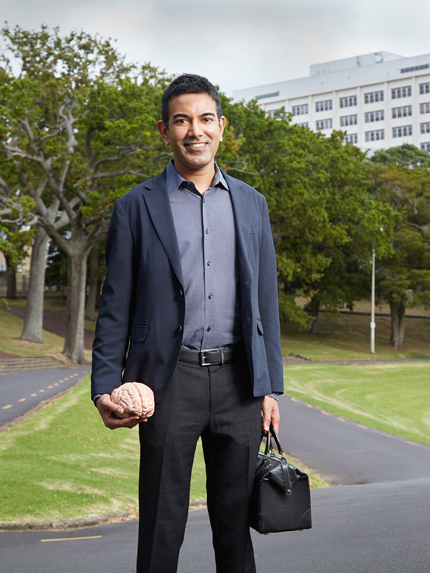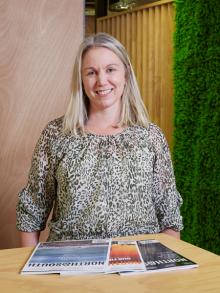To make a difference
To the untrained eye, it appears simple enough: apply electrical pulses to the brain to block abnormal signals. But Aucklander Dr Viswas Dayal says Deep Brain Stimulation (DBS) is anything but simple.
It’s why he headed to London in 2016, to do a PhD in neurology and work at London’s National Hospital for Neurology, specialising in DBS for patients with Parkinson’s Disease.
“I took advantage of recent technological advances to programme the stimulation and develop algorithms to improve clinical outcomes and reduce side effects,” Viswas says. “The overall result was positive, with dramatic improvements in many patients.”
They were the kind of opportunities he could never have had in New Zealand. The National Hospital of Neurology is the largest DBS centre in Europe, providing access to numbers of patients unseen in New Zealand, and the opportunity to explore cutting-edge research using technology that is not available here.
Even though his wasn’t the usual Kiwi kind of OE, Fijian-born Viswas still managed to play. “I travelled a lot, including to speak at medical seminars across Europe and the United States,” he says. “I also made the most of London’s buzzing lifestyle and social scene.”
Life was good but the 37-year-old knew the ride would end sometime. “In early 2020, I reached a cross-roads,” he says. “I’d finished my PhD and was looking at either coming home or finding a new job in London. I knew I’d always come back to New Zealand at some stage, but it depended on wherever I got a job offer.”
He didn’t have to wait long: the day after Viswas was awarded his doctorate, he was offered a job at Auckland City Hospital.
“It wasn’t a hard decision to come home because I’ve always felt a sense of loyalty to New Zealand and wanted to bring back the skills I’ve gained overseas. I felt my experience could make a tangible difference here.”
Back in Auckland, he was relieved that managed isolation wasn’t as bad as he’d imagined.
“Isolation passed quicker than I expected and was far less daunting than I’d heard. The moment I walked out of isolation and threw off my mask, there was an immediate sense of liberation. My family was overjoyed to see me, knowing that this time I wasn’t here for a brief visit, but was home for good.”
They were also relieved that their son and brother was no longer living in one of the world’s Covid-19 hotspots.
“Looking at the UK now, things have taken a turn for the worse and I can’t thank my stars enough for being able to come back to a place that I, and my envious friends and colleagues around the globe, feel is the best place to be.”
The transition hasn’t been without its speed-bumps. Viswas splits his time between Auckland City Hospital and Middlemore Hospital (in South Auckland) driving from his family's home in Albany, on the North Shore, where he’s staying until he finds a central city apartment.
“That’s one thing I’ve noticed since being back – how bad Auckland traffic is! I can spend up to three hours a day driving. I really miss the Tube... I didn’t need a car in London.”
Viswas is also missing access to the UK’s advanced medical technology. “I’m hoping to share what I learned, but we have yet to introduce some of that DBS technology to New Zealand. It’s a bit frustrating but I’m pushing to get it as soon as possible, so we can offer our patients the best possible treatment.”
Although work is busier in Aotearoa than it was in London, Viswas admits he’s finding the pace of life more relaxed and the culture less formal.
“Overall, processes and systems in New Zealand are more efficient and adaptable. For example, I can walk into a bank with my passport, open an account and get my card issued quite quickly, whereas the bureaucracy in the UK is enormous and I had to jump through lots of hoops and had significant delays for simple processes, which was frustrating.”
His move home, he says, is permanent. “So many Kiwis go overseas and never come back. But we’ve now got people returning, whether because of Covid-19 or other reasons, bringing with them a huge pool of talent, resources and experience which we’re able to tap into. That’s a great thing for New Zealand.”
Reported by Sharon Stephenson for our AA Directions Autumn 2021 issue




